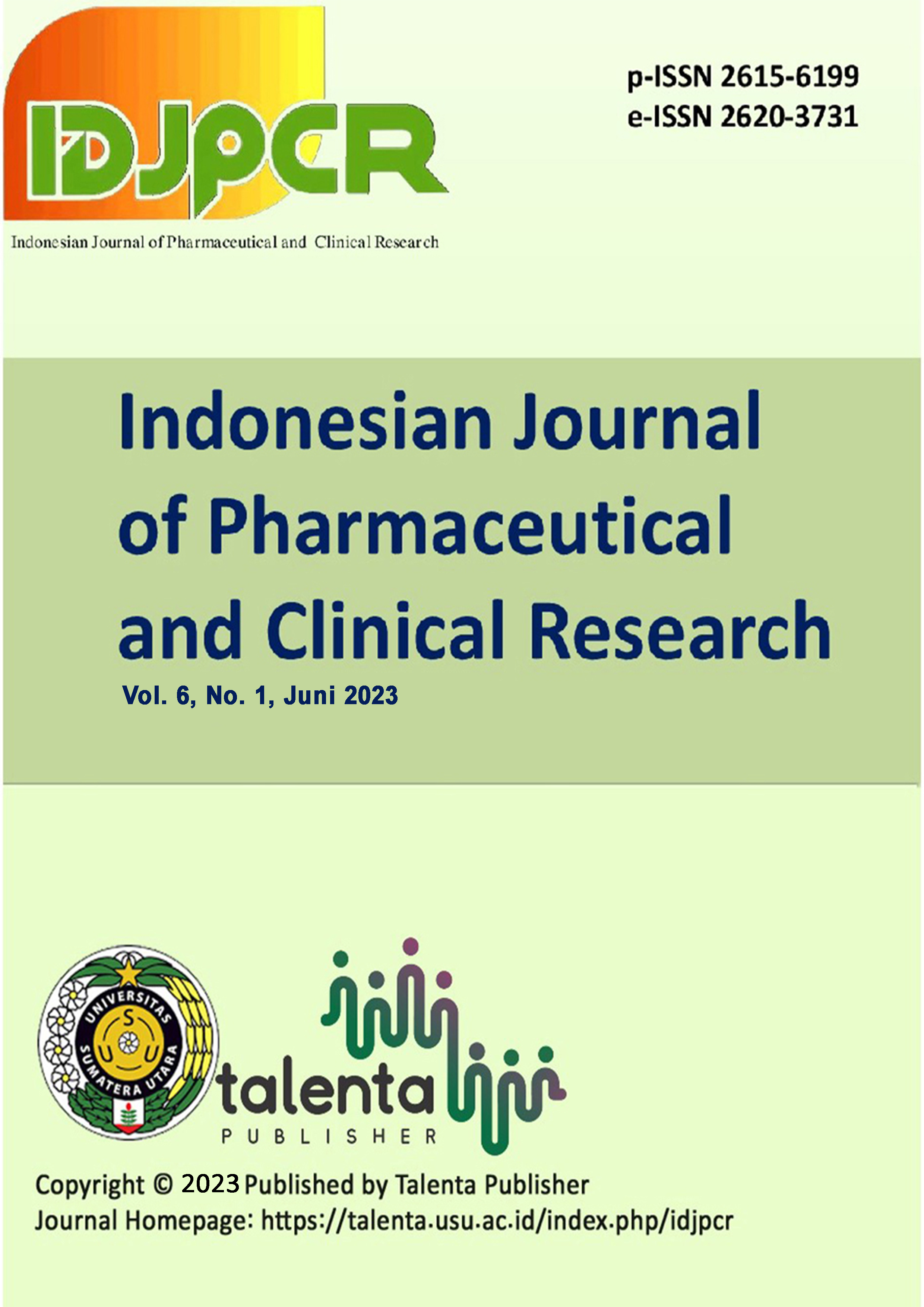Phytochemical Screening and Antibacterial activity of Polyphenol rich Extract of Passion Fruit Pericarp (Passiflora edulis Sims) on Propionibacterium acnes
DOI:
https://doi.org/10.32734/idjpcr.v6i1.17765Keywords:
Passiflora edulis Sims, antibacterial, Propionibacterium acnes, Phytochemical.Abstract
Indonesia's primary hub for cultivating purple passion fruit is North Sumatera. The passion fruit was transformed into a beverage product, which led to the creation of passion fruit pericarp trash. The potential medicinal properties of the passion fruit pericarp, particularly its antibacterial impact, need to be further explored. This study aimed to assess the phytochemical composition and antibacterial properties of an ethanol extract derived from the pericarp of purple passion fruit against Propionibacterium acnes. The extraction was performed using the percolation method with 96% ethanol. The antibacterial activity against Propionibacterium acnes was assessed using the agar diffusion method with paper discs. The phytochemical screening of the simplicia and ethanol extract revealed the existence of flavonoid, glycoside, saponin, tannin, and steroid/triterpenoid compounds. The ethanol extract exhibited significant antibacterial activity against Propionibacterium acnes at a dosage of 300 mg/ml, demonstrating a dose-dependent impact.
Downloads
References
. Hamilton AC. Medicinal plants, conservation and livelihoods. Biodiversity & Conservation. 2004 Jul;13:1477-517.
. Zhang J, Tao S, Hou G, Zhao F, Meng Q, Tan S. Phytochemistry, nutritional composition, health benefits and future prospects of Passiflora: A review. Food Chemistry. 2023 Jul 8:136825.
. Nugraha SE, Achmad S, Sitompul E. Antibacterial activity of ethyl acetate fraction of passion fruit peel (Passiflora Edulis Sims) on Staphylococcus aureus and Escherichia coli. Indonesian Journal of Pharmaceutical and Clinical Research. 2019 Apr 25;2(1):07-12.
. Ghada B, Pereira E, Pinela J, Prieto MA, Pereira C, Calhelha RC, Stojković D, Sokóvić M, Zaghdoudi K, Barros L, Ferreira IC. Recovery of anthocyanins from passion fruit epicarp for food colorants: Extraction process optimization and evaluation of bioactive properties. Molecules. 2020 Jul 14;25(14):3203.
. Chagas VT, Coelho RM, Gaspar RS, da Silva SA, Mastrogiovanni M, Mendonca CD, Ribeiro MN, Paes AM, Trostchansky A. Protective effects of a polyphenolâ€rich extract from Syzygium cumini (l.) skeels leaf on oxidative stressâ€induced diabetic rats. Oxidative medicine and cellular longevity. 2018;2018(1):5386079.
. Banu KS, Cathrine L. General techniques involved in phytochemical analysis. International journal of advanced research in chemical science. 2015 Apr;2(4):25-32.
. Peñarrieta JM, Alvarado JA, BergenstÃ¥hl B, Ã…kesson B. Spectrophotometric methods for the measurement of total phenolic compounds and total flavonoids in foods. Revista boliviana de QuÃmica. 2007;24(1):5-9.
. Csepregi K, Kocsis M, Hideg É. On the spectrophotometric determination of total phenolic and flavonoid contents. Acta Biologica Hungarica. 2013 Dec 1;64(4):500-9.
. Lund ME, Hawkinson RW. Evaluation of the Prompt inoculation system for preparation of standardized bacterial inocula. Journal of clinical microbiology. 1983 Jul;18(1):84-91.
. Saral A, Kardil U, Düzgün AÖ. Antibacterial activity of DMSO extracts of selected plants against antibiotic resistant clinical isolates. Erzincan University Journal of Science and Technology. 2019;12(2):576-84.
. Qadrie ZL, Jacob B, Anandan R, Rajkapoor B, Ulla MR. Anti-bacterial activity of ethanolic extract of Indoneesiella echioides (L) nees. evaluated by the filter paper disc method. Pakistan journal of pharmaceutical sciences. 2009 Apr 1;22(2).
. Behl T, Rocchetti G, Chadha S, Zengin G, Bungau S, Kumar A, Mehta V, Uddin MS, Khullar G, Setia D, Arora S. Phytochemicals from plant foods as potential source of antiviral agents: An overview. Pharmaceuticals. 2021 Apr 19;14(4):381.
. Ho KY, Tsai CC, Huang JS, Chen CP, Lin TC, Lin CC. Antimicrobial activity of tannin components from Vaccinium vitisâ€idaea L. Journal of Pharmacy and Pharmacology. 2001 Feb;53(2):187-91.
. Barbosa AD. An overview on the biological and pharmacological activities of saponins. Int J Pharm Pharm Sci. 2014;6(8):47-50.
. Ahmadi S, Ahmadi G, Ahmadi H. A review on antifungal and antibacterial activities of some medicinal plants. Micro Nano Bio Aspects. 2022 May 1;1(1):10-7.
. Navarre WW, Schneewind O. Surface proteins of gram-positive bacteria and mechanisms of their targeting to the cell wall envelope. Microbiology and molecular biology reviews. 1999 Mar 1;63(1):174-229.
. Li P, Zhou C, Rayatpisheh S, Ye K, Poon YF, Hammond PT, Duan H, Chanâ€Park MB. Cationic peptidopolysaccharides show excellent broadâ€spectrum antimicrobial activities and high selectivity. Advanced Materials. 2012 Aug 8;24(30):4130.
. Tavares TD, Antunes JC, Padrão J, Ribeiro AI, Zille A, Amorim MT, Ferreira F, Felgueiras HP. Activity of specialized biomolecules against gram-positive and gram-negative bacteria. Antibiotics. 2020 Jun 9;9(6):314.
Downloads
Published
How to Cite
Issue
Section
License
Copyright (c) 2023 Indonesian Journal of Pharmaceutical and Clinical Research

This work is licensed under a Creative Commons Attribution-ShareAlike 4.0 International License.
The Authors submitting a manuscript do so on the understanding that if accepted for publication, copyright of the article shall be assigned to Indonesian Journal of Pharmaceutical and Clinical Research (IDJPCR) and Faculty of Pharmacy as well as TALENTA Publisher Universitas Sumatera Utara as publisher of the journal.
Copyright encompasses exclusive rights to reproduce and deliver the article in all form and media. The reproduction of any part of this journal, its storage in databases and its transmission by any form or media, will be allowed only with a written permission from Indonesian Journal of Pharmaceutical and Clinical Research (IDJPCR).
The Copyright Transfer Form can be downloaded here.
The copyright form should be signed originally and sent to the Editorial Office in the form of original mail or scanned document.









